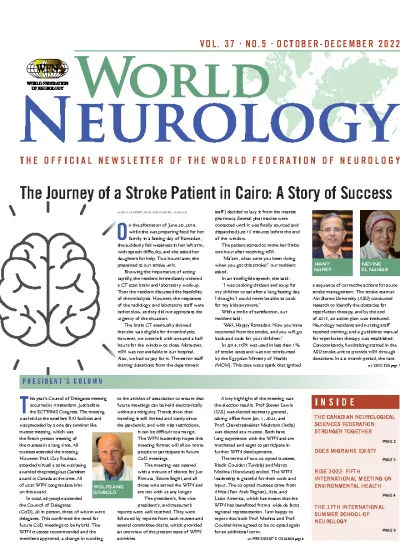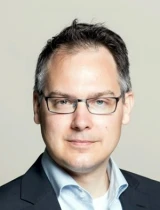Document download: World Neurology - October-December 2022

Description:
World Neurology: October-December 2022, Volume 37, No. 5
Release date: 15 Dec 2022
Published: 20 Aug 2025
Filename:
wn_oct_dec22.pdf
File type and size:
pdf, 15.44 MB
View/download:
Published by Ascend Integrated Media LLC, Kansas, USA
From the editors
Steven L. Lewis, MD, Editor, and Walter Struhal, MD, Co-Editor



By Steven L. Lewis, MD, Editor, and Walter Struhal, MD, Co-Editor
This issue begins with this issue's President's Column, where WFN President Dr. Wolfgang Grisold reports on the recent Council of Delegates (COD) meeting that occurred in Amsterdam in October and updates us on many of the continuing and evolving global activities of the WFN including the active preparations for the upcoming World Congress of Neurology (WCN) to be held in Montreal in October 2023. Dr. Hany Aref and Dr. Nevine El Nahas then discuss the successful development and ongoing activities of the stroke center in Ain Shams University in Cairo. Dr. Steven Peters then updates us on the history of the Canadian Neurological Sciences Federation and the unique federated model of this organization, in anticipation of the WCN in Montreal.
In a unique article in the issue, and in lieu of the usual history contribution, Dr. Joost Haan provides a thought piece on the existence of migraine as an entity; this is accompanied by a thoughtful commentary of this article by Dr. Richard Stark. Dr. Christina Zjukovskaja and Dr. Jacques Reis then update us on the fifth international meeting on environmental health held in Strasbourg, France in September.
Dr. Syrine Ben Mammou provides a report of her experience as a recipient of a WFN Junior Traveling Fellowship that provided the funding for her to present her research at the EAN Congress in Vienna this past June. Dr. Ovidiu Selejan and Dr. Dafin Muresanu then report on the successful 17th International Summer School in Neurology that was held on the shores of the Black Sea in Romania in July 2022. Dr. John England next updates us on the new metrics of the Journal of the Neurological Sciences, the official journal of the WFN.
Finally, this issue features in memoriam articles on two international giants of neurology. Dr. Robert Lisak and Dr John England provide their obituary on Dr. Arthur Knight Asbury. Dr. Alla Guekht and the WFN Specialty Group on Neuroepidemiology each present their obituaries on Dr. Ettore Beghi.
In this last issue of World Neurology of this calendar year, we want to thank all readers for their interest in and attention to World Neurology and we continue to invite ideas for contributions to be sent to us at the email addresses listed in the issue. We hope everyone is marking their calendars and making plans to attend the WCN in Montreal in October 2023—it will be a remarkable international event. ■
Highlights
President's Column
- This year's Council of Delegates meeting occurred in Amsterdam, just before the ECTRIMS Congress. The meeting was held at the excellent RAI facilities and was preceded by a one-day seminar-like trustee meeting, which was the first in-person meeting of the trustees in a long time. All trustees attended the meeting. However, Prof. Guy Rouleau attended virtually, as he was being awarded the prestigious Gairdner award in Canada at the time. All of us at WFN congratulate him on this award.
WFN Publications
- New Metrics Released for the Journal of the Neurological Sciences
By John D. England, MDI am pleased to announce that new metrics have been released for the Journal of the Neurological Sciences, the official journal of the World Federation of Neurology (WFN). The widely cited Impact Factor (IF) has risen to 4.553, which is a +46.2% increase compared to the previously reported IF. This is an all-time high for the journal's Impact Factor.
Junior Travelling Fellowship Report 2022
- EAN Congress
By Syrine Ben MammouThanks to World Federation of Neurology, I had the opportunity to attend the Eighth European Academy of Neurology Congress June 25-28, 2022, in Vienna Austria. Since the COVID-19 pandemic, many conferences were cancelled or presented virtually. This was my first participation in an international congress of neurology as a junior resident.
Around the World
- The Journey of a Stroke Patient in Cairo: A Story of Success
By Hany Naref and Nevine El NahasOn the afternoon of June 30, 2014, while she was preparing food for her family in a fasting day of Ramadan, she suddenly felt weakness in her left arm, with speech difficulty, and she asked her daughters for help. Two hours later, she presented to our stroke unit. Knowing the importance of acting rapidly, the resident immediately ordered a CT scan brain and laboratory workup. Then the resident discussed the feasibility of thrombolysis. However, the responses of the radiology and laboratory staff were rather slow, as they did not appreciate the urgency of the situation.
- The Canadian Neurological Sciences Federation: Stronger Together
By Steven Peters, MDThe Canadian Neurological Sciences Federation (CNSF) has been a unifying organization in Canada since 2006, though its roots stretch back to the 1940s. Neurosurgeons, adult and pediatric neurologists, neuroradiologists, and electrophysiologists all have a home under a single federation. In this unique arrangement, each member society also maintains its own executive and specific initiatives but works collaboratively with all CNSF societies. The cooperation between societies enriches the annual national congress, where the entire spectrum of physicians in the neurosciences are able to join together for networking and to address issues specific to Canadian health care.
- RISE 2022: Fifth International Meeting on Environmental Health
By Christina Zjukovskaja, MSc, and Jacques Reis, MD, PhDThis year's meeting on environmental health took place over two days and in a hybrid format in order to allow active participation unencumbered by travel. Participants and speakers from all over the world were able to gather, report findings as well as discuss relevant topics. Day 1 included sessions on neurotoxicology, exposure science, and the clinical approach of exposure sciences. Day 2 included neurological impacts of climate change, health impacts of air pollution, long COVID as well as diseases and environmental risk factors.
- The 17th International Summer School of Neurology
By Ovidiu Selejan and Dafin MuresanuThe 17th International Summer School of Neurology took place July 8-10, 2022, and was organized as a hybrid event. This educational activity along with the Fifth Teaching Course on Rare Neurological Diseases, brought together a lively audience of over 1,400 participants in a hybrid format, both online and on-site. In addition, the 3-day event hosted an online parallel session, "Psychiatry Perspectives in Neurocognitive Disorders" and a satellite session (on-site, on the shores of the Black Sea in Romania), focused on clinical case studies.
History
- Does Migraine Exist?
By Joost Haan, MD, PhD, BAThere is no objective test for migraine. Migraine cannot be proven with a scan, blood test, or EEG. The neurological examination during and outside attacks is usually normal. A diagnosis of "migraine" can only be made on the words with which patients describe past experiences. Their words must be "read" to get a diagnosis. Based on sparse, remembered, and metaphorical information, doctors worldwide make a diagnosis of migraine to distinguish it from, for example, tension-type headaches, a diagnosis that is also based on words.
In Memoriam
- Arthur Knight Asbury, MD 1928-2022
By Robert P. Lisak, MD, and John D. England, MDWhen Arthur K. Asbury, Van Meter professor of neurology emeritus at the Perelman School of Medicine of the University of Pennsylvania, died on Oct. 19, 2022, at the age of 93, the neurologic world lost a true giant, and many of us lost a friend and mentor.
- Ettore Beghi
By Alla GuekhtEttore Beghi was born in Milan, Italy, on Aug. 15, 1947. He received his MD at the University of Milan (1972), completed post-doctoral clinical fellowship in neurology with graduation at the neurologic clinic of the same university (1976), obtained a masters of pharmacologic sciences research at the Istituto Mario Negri in Milan (1981), and served as a research fellow in the department of medical statistics and epidemiology at Mayo Clinic in Rochester Minnesota (1982–1983).







